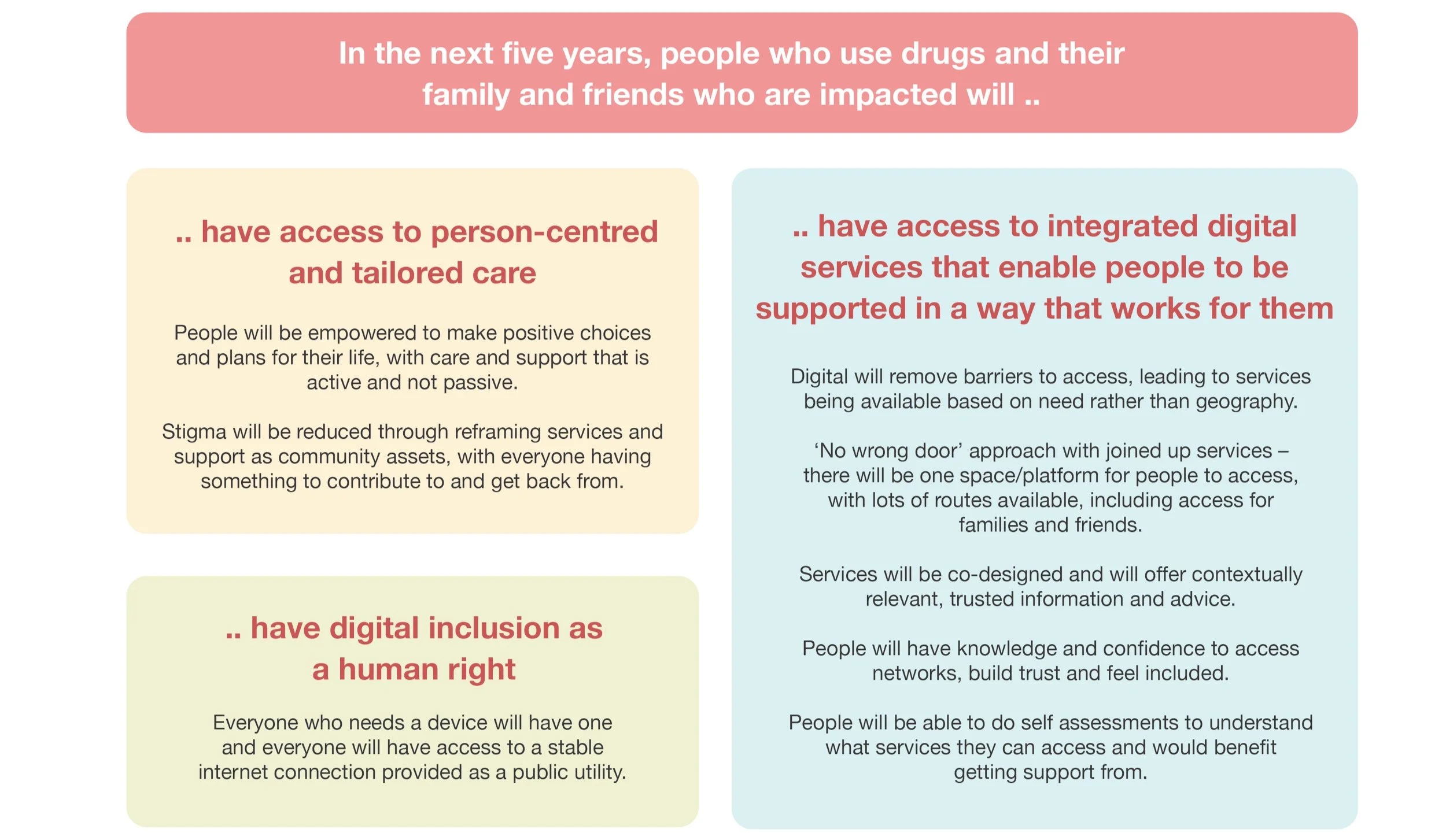digital lifelines
DHI Discover and define
An overview of activities and findings from the integrated ‘Discover and Define’ workstream led by DHI between March and December 2022, as part of the Digital Lifelines Scotland programme. A copy of the full final report can be downloaded here.
Background
Digital Lifelines Scotland seeks to increase digital inclusion and to design new digital solutions with and for people with multiple and complex needs at increased risk of drug related harm. It aims to improve the health outcomes for people who use drugs, reducing the risk of harm and death.
The Digital Health and Care Innovation Centre (DHI) joined the Digital Lifelines programme in March 2022 with the aim to work with delivery partners, organisations delivering services, and people who use drugs, to collaboratively produce a future vision for digitally enabled services to better support people who use drugs. DHI’s role in the programme was to analyse and synthesise activities and findings from the Discover phase; support the Define phase through mapping current services; and collaboratively identifying and developing opportunities for future digitally enabled services.
Role of digital in enabling connections
METHODOLOGY
The Programme has taken an approach based on the Scottish Approach to Service Design (SAtSD) to ensure that time is taken to fully understand the needs of affected people and organisations before co-designing appropriate solutions with them. This typically follows a process of ‘Discover’, ‘Define’, ‘Develop’ and ‘Deliver’. It is a flexible framework which employs design methods to enable organisations responsible for providing services to work together with people who access services and staff who provide these services to define the problems before moving to solutions.
As partners in the DHI, design researchers at the Innovation School at The Glasgow School of Art provide expertise in participatory design approaches to creatively engage people with lived experience and those delivering services to co-design future experiences of care and support for people who use drugs.
A participatory design approach with bespoke methods and tools tailored to this context was employed to iteratively engage with a diverse group of participants and identify ways of reducing risk of harm and supporting people who use drugs to live well. To integrate a diverse range of perspectives – including delivery partners, people who use drugs, organisations delivering services and the wider sector, and ensure that emerging digital innovation opportunities meet the expectations and needs of all those who provide and receive care and support, activities were organised in two stages:
Scoping the project to identify collective priorities from a programme delivery and wider sector perspective to inform the focus areas for the integrated ‘Discover and Define’ workstream.
Mapping the current to understand what services and support are currently available, and the experiences of accessing services and support from the perspective of people who use drugs, and collaboratively identifying and developing opportunities for future digitally enabled services.
SCOPING THE PROJECT
Analysing and synthesising insights
We analysed and synthesised emerging insights from the documents that the Digital Lifelines programme team had collated based on the work carried out in the initial Discover phase. To contextualise these emerging insights, we also reviewed additional literature focusing on ongoing developments in the wider services and policy landscape. This included a particular focus on understanding the diversity in experiences of people who use drugs, and identifying factors that contribute to making people more vulnerable to or put them at higher risk of experiencing drug related harm.
Scoping conversations
During the initial stages, four scoping conversations were set up to gain an overall understanding of the Digital Lifelines programme and to support with contextualising and sense-making of the Discover documents. Following a collaborative review with the delivery team sense-checking emerging insights based on these initial conversations and analysis of Discover documents, four additional scoping conversations were organised to delve deeper into the emerging insights and build on partners’ contextual knowledge and expertise to further inform the scope of this phase.


Sense checking emerging focus areas from policy, services and lived experiences perspectives
Horizon scanning
A horizon scanning activity was undertaken by DHI with the aim of mapping emerging technologies and digital opportunities for preventing drug related harm and death, across the UK and internationally – with a particular focus on digitally enabled services and solutions aimed at reducing risk and/or reducing vulnerability.
Community of Learning sessions
Attending the Community of Learning sessions organised monthly by Early Adopter 2 partners provided the opportunity to meet third sector organisations and learn from their experiences and knowledge of the wider context, people and communities.
Collaborative reviews with the delivery team
An early version of emerging insights from the analysis and synthesis of the initial Discover documents and the scoping conversations was shared with the Digital Lifelines delivery team. The aim was to collaboratively sense-check the insights and identify any potential gaps, and build on the delivery teams’ expertise to collectively identify priorities and focus areas for this work stream. A second collaborative review session was organised with the delivery team to further share the insights and refined focus areas based on the outputs from the first collaborative review and additional scoping conversations, with the aim to collectively frame and finalise the scope of the integrated Discover and Define phase.
Situating DHI Discover and Define alongside other Digital Lifelines work streams and framing overall focus of participatory engagements
Mapping the Current
Collaborative workshop
DHI led a collaborative workshop as part of a sharing session organised by the Digital Lifelines programme team with participants from policy and wider sector. The aim of the workshop was to collectively review insights and opportunities emerging to date and map connections with ongoing developments in the sector and relevant policy areas.
Service mapping engagements
The service mapping engagements aimed to capture the ways in which statutory and third sector services currently support people who use drugs, to better understand how the services and roles are connected or not connected with other services, and identify potential opportunities for joined up delivery and the role of digital in enabling this.
Video from the collaborative workshop with participants from policy and wider sector
Lived experience engagements
Five lived experience engagements were organised in Dundee City, engaging with people at different stages of their journey of using drugs and living well to capture a diverse set of experiences. Participants were supported to share their journeys using a visual tool that was designed around the metaphor of a ‘healing forest’. Participants were guided through three interconnected activities – the first focusing on getting to know the person and understanding what living well means to them; the second focusing on capturing their current circle of support and care; and the final activity focusing on exploring opportunities for future support and care.
Final collaborative review
The maps and transcripts from the collaborative workshop, service mapping engagements and lived experience engagements were thematically analysed, to synthesise emerging insights and key themes from each session. The emerging insights and themes were shared with the Digital Lifelines delivery team, to collaboratively sense-check insights and identify any potential gaps, and build on the delivery teams’ expertise to identify priorities for the Develop Brief. Following this, key themes across these were reviewed to identify potential opportunities to inform the Develop phase.
Metaphors used for visual tool mapping lived/living experience
“We were delighted with the highly visual methods and the sensitivity used to communicate and to engage people with living and lived experience and staff in understanding and mapping the current situation. The collaborative and iterative approach engaged stakeholders and ensured validity and acceptance of the proposals which emerged. We now have a clear set of requirements for the next phase of work, a means of communicating this clearly and visually and enhanced strategic coherence across numerous delivery partners.”
key insights and opportunities
WIDER SECTOR
Key insights from the collaborative workshop were synthesised into vision statements for the future and emerging themes on opportunities for the wider sector.
Future vision for services and support
Opportunities for the wider sector
SERVICES
The systems and pathways related to delivery of care and support for people who use drugs is complex due to the overlapping focus areas across traditional organisational and strategic boundaries, and local variations in practice across Scotland. It was, therefore, not within the scope of this phase of the workstream to be able to collaboratively work with all services across Scotland.
We explored options for geographically framing the scope of activities in this phase across two locations during a collaborative review with the delivery team, and agreed to focus on Dundee City and Aberdeen City based on an expression of interest from local area partners in these contexts to collaborate on the programme during conversations with the DHI.
Key services, roles and connections identified by workshop participants from statutory services and third sector in Aberdeen City and Dundee city are captured below.

Key services, roles and connections in Aberdeen City

Key services, roles and connections in Dundee City
While there were some overlapping themes around sharing data and accessing services that emerged across the two workshops, the need for better data sharing and joined up working emerged as key opportunities for future services in Aberdeen City, and increasing access to services and addressing overlapping needs such as homelessness and mental health support emerged as key opportunities for future services in Dundee City.
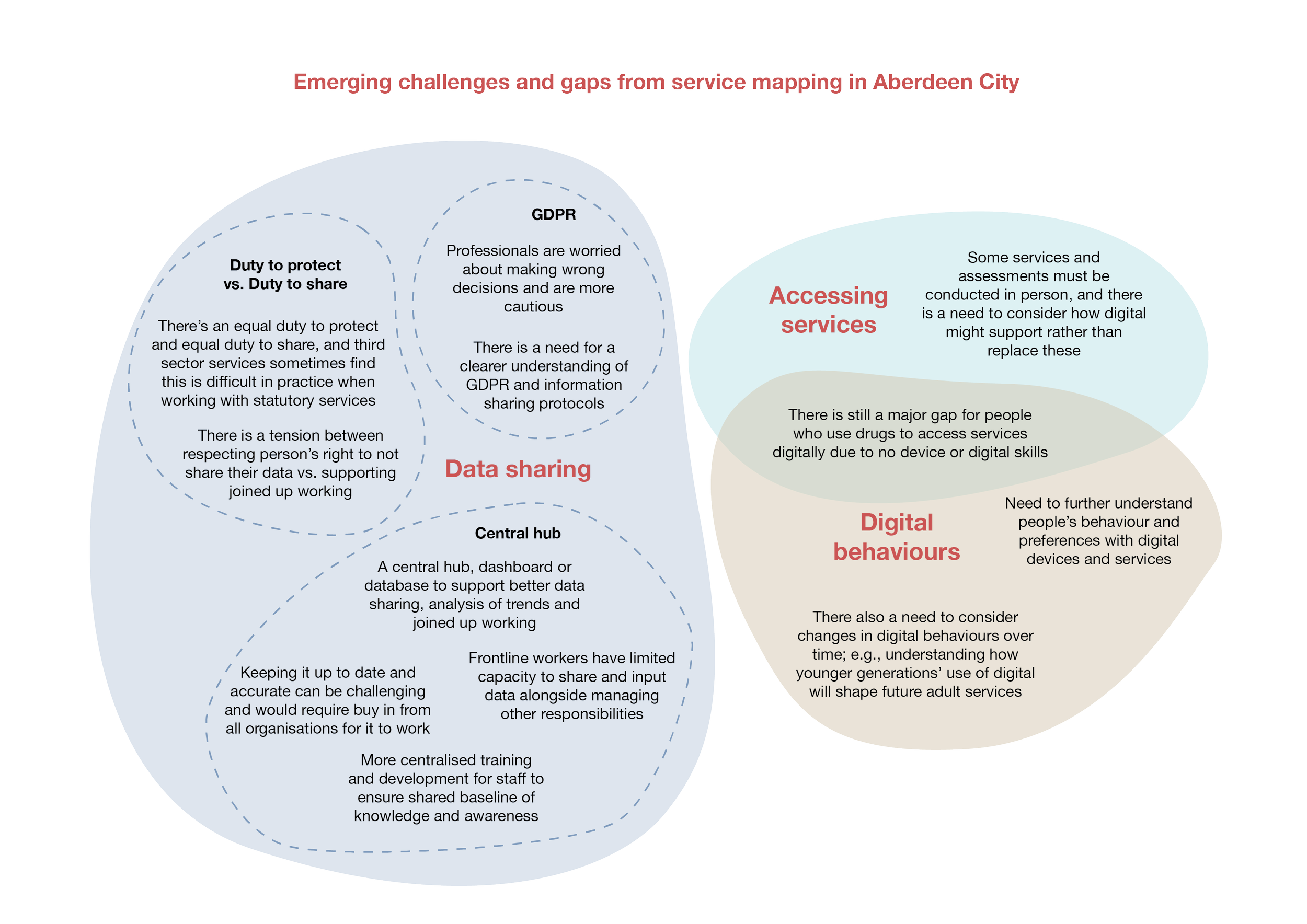
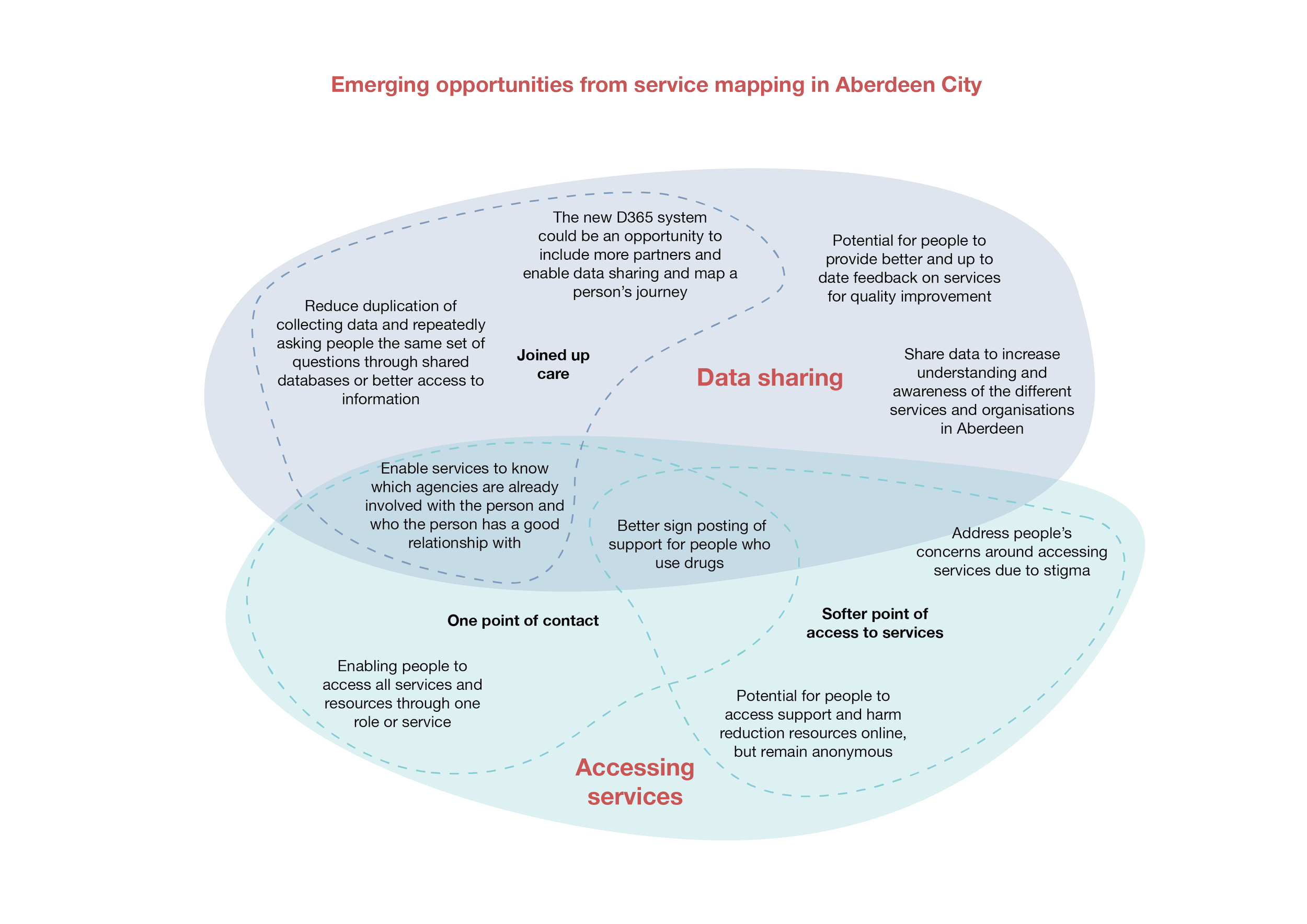
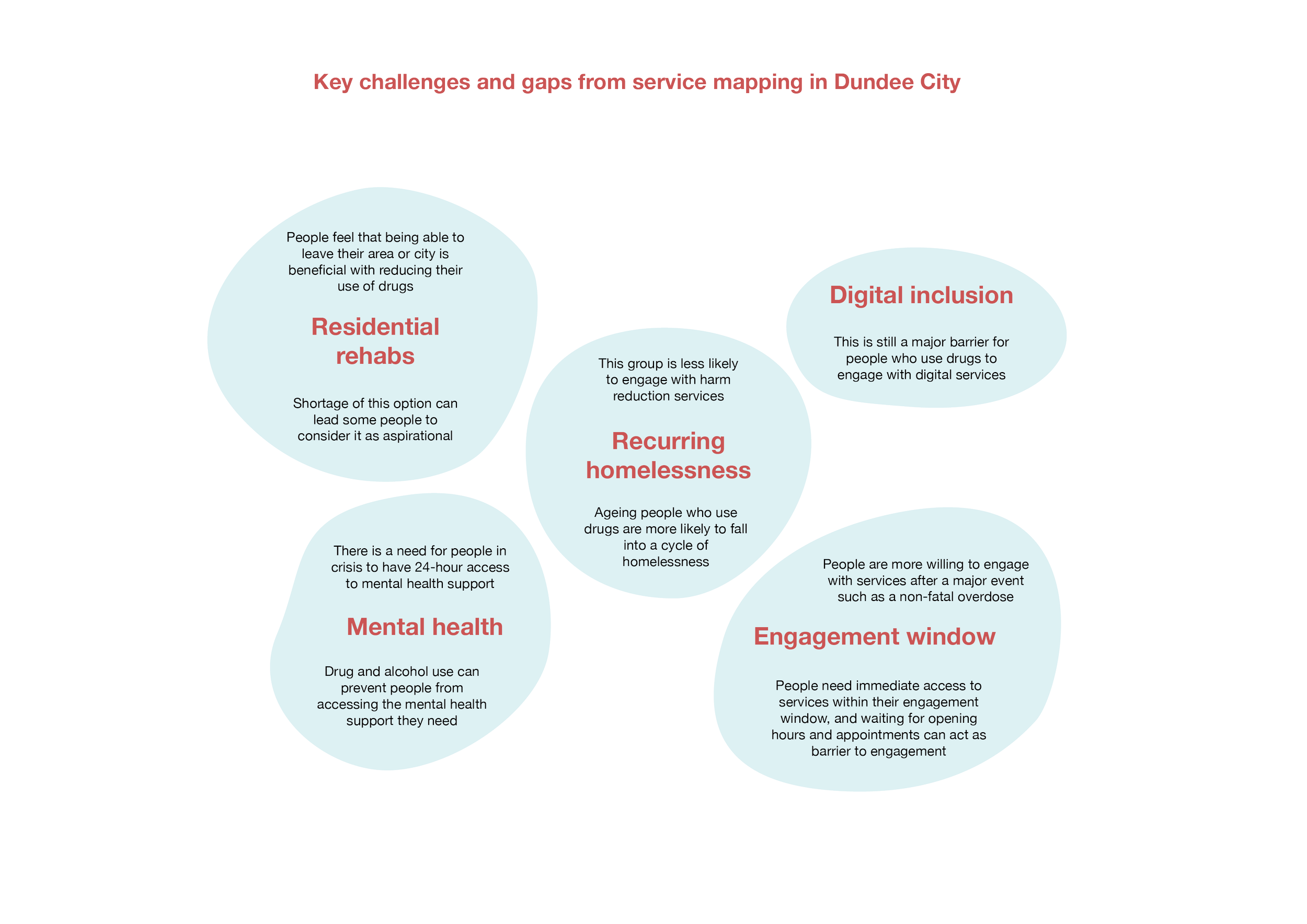
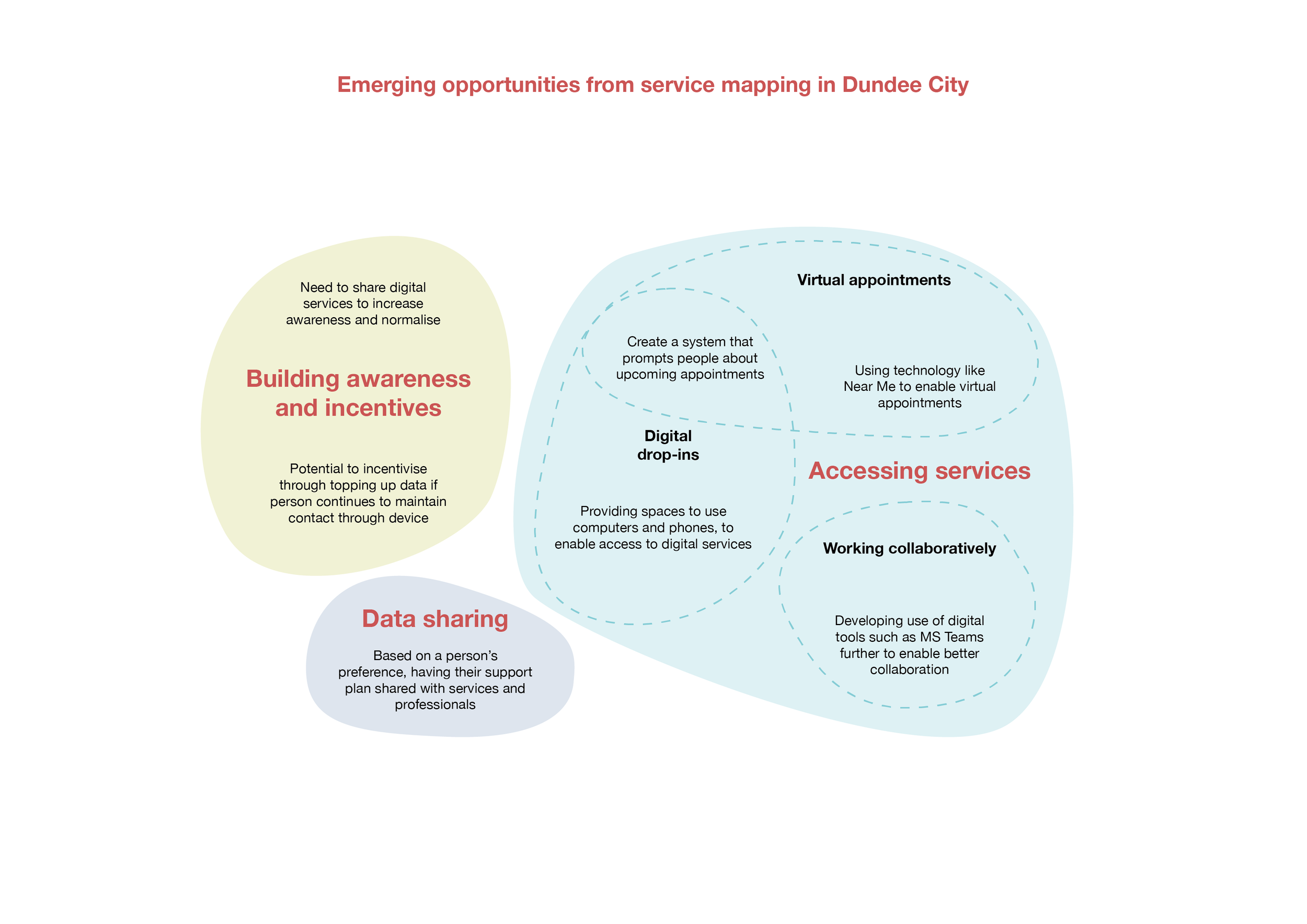
Emerging themes around challenges and opportunities for services in Aberdeen City and Dundee City
PEOPLE
The lived engagements were framed around living well and exploring people’s journey of using drugs, acknowledging that ‘recovery’ is personal to everyone with varied definitions of what it means. Recruitment focused on capturing the diversity in these experiences - and our recruitment partners identified people who currently access their services, who are at different stages of seeking support and engaging with the services. Key insights and themes emerging from each of the lived experience engagements have been synthesised visually to capture people’s personal journeys and the diversity in their experiences, and participants were given the opportunity to review them.
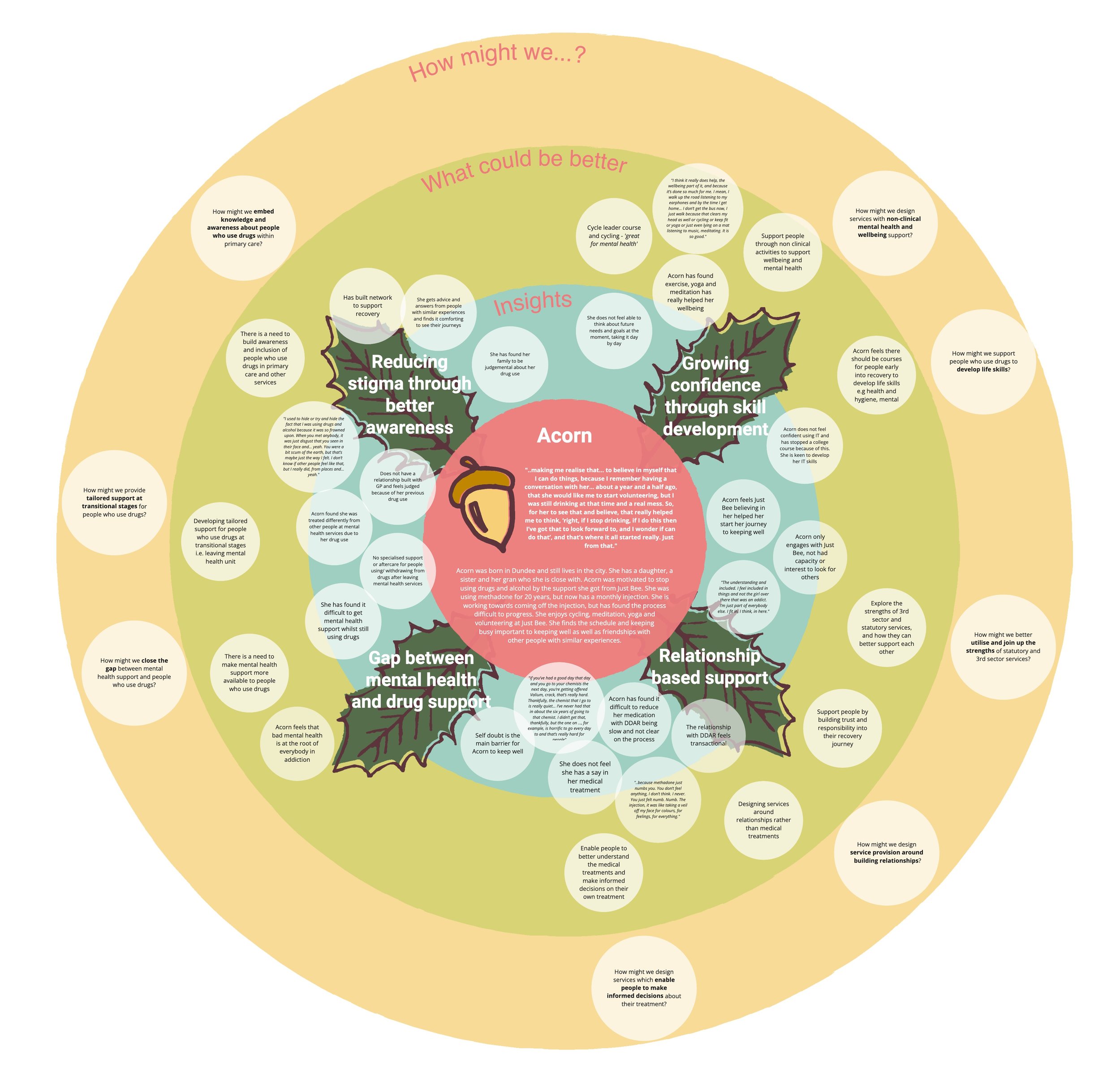

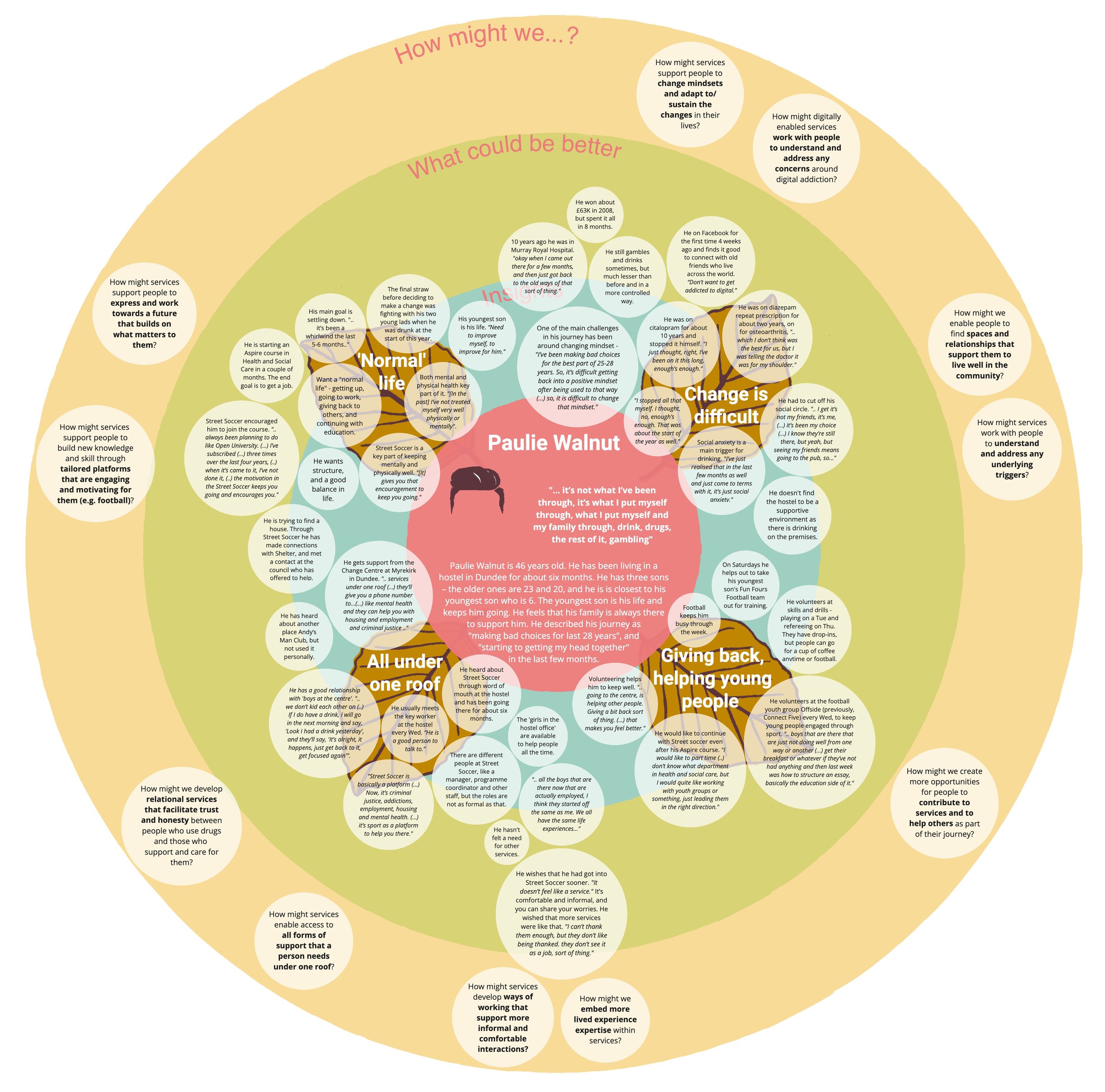
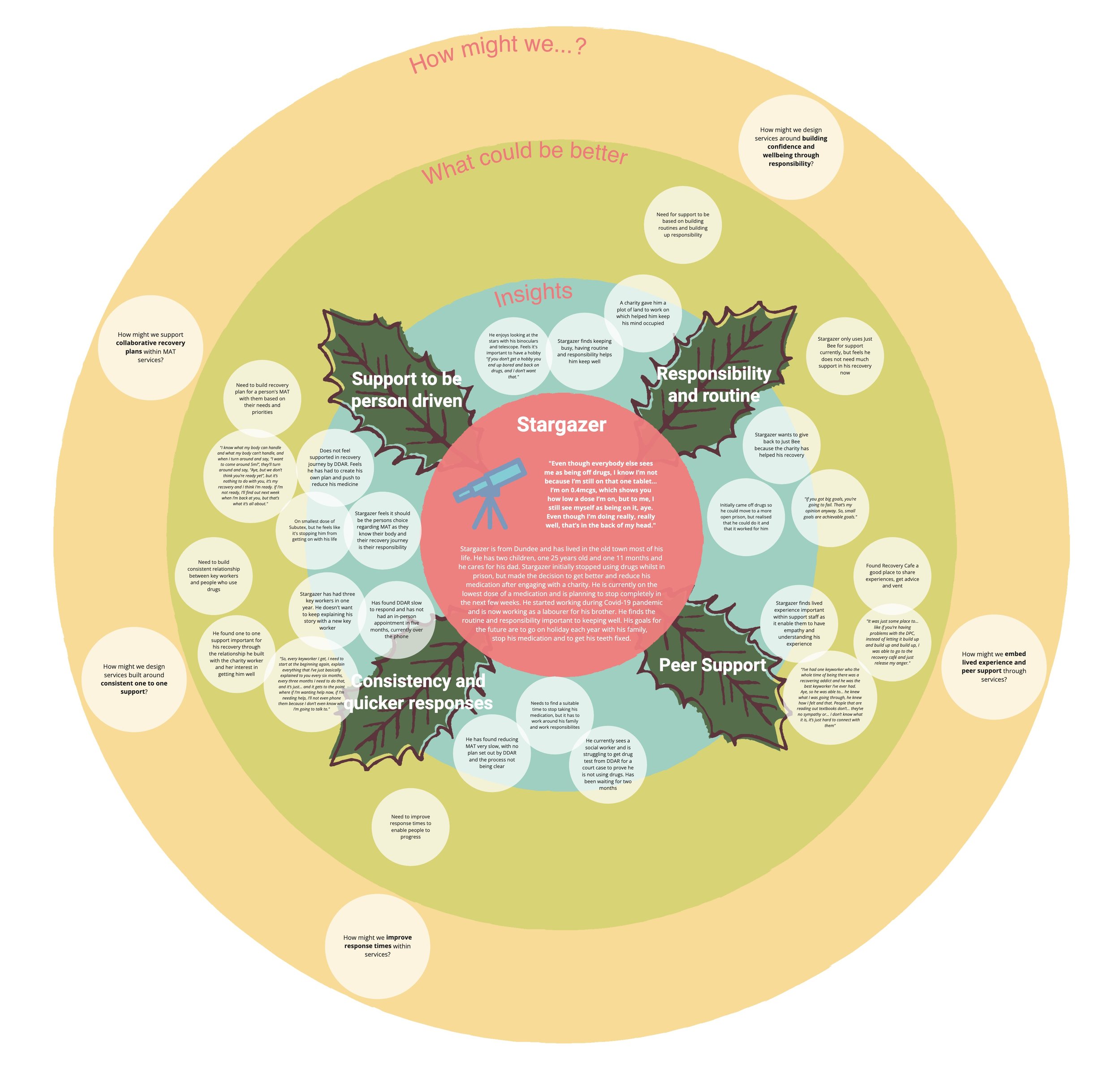
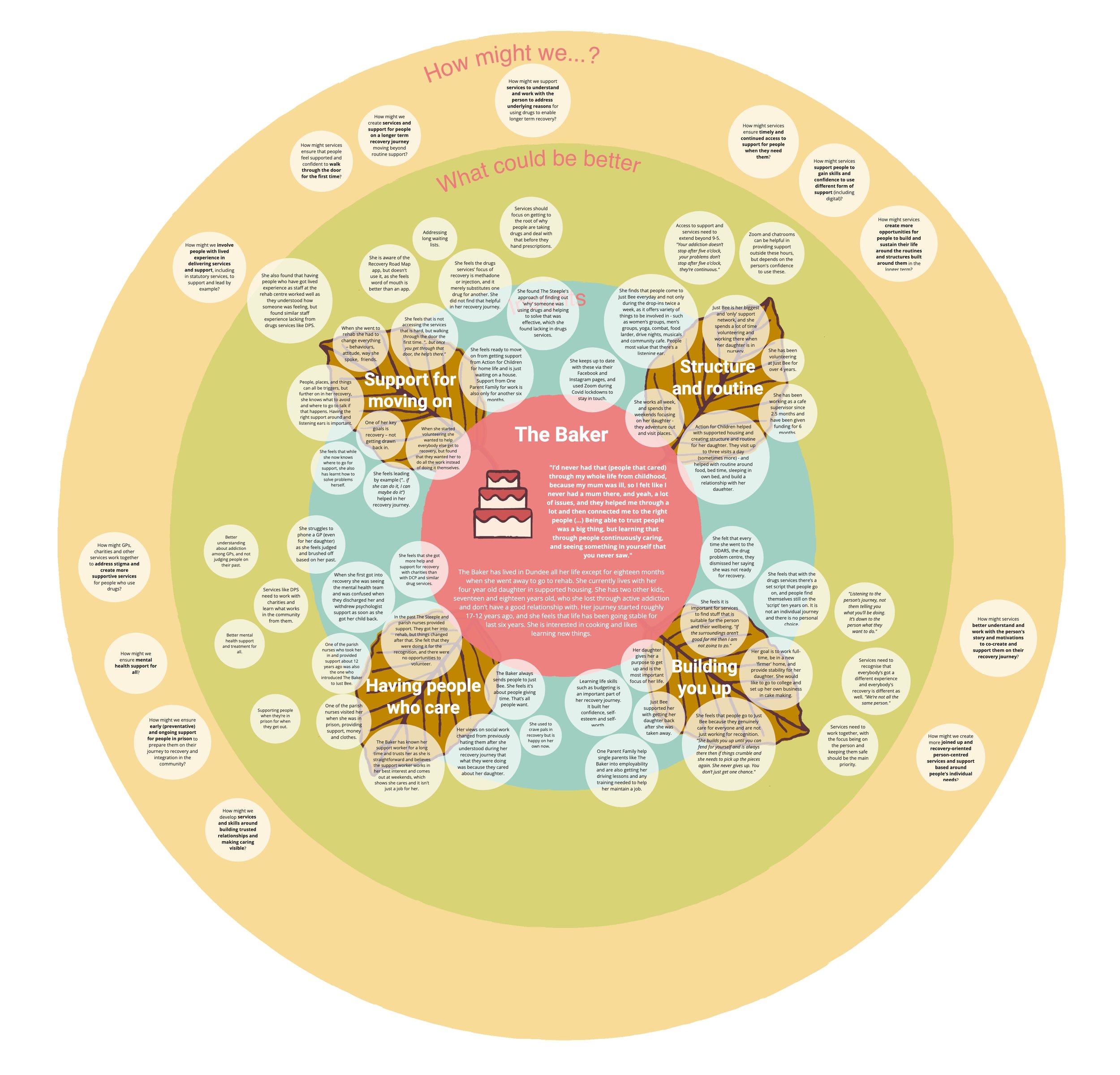
“Street Soccer is basically a platform (...) it’s criminal justice, addictions, employment, housing and mental health (...) it’s sport as a platform to help you there.”
Shared opportunities for service and support across people’s experiences include: focusing on the person not their drug use; building relationships and making care visible; mental health and wellbeing support for living well; routines, structures and responsibilities for living well; building the person up through motivations, skills and knowledge; embedding lived experience in services and peer support; multi-agency support through single point of contact; addressing stigma and support within primary care and other services; supporting informed decisions around medically-assisted pathways.
collective Vision
Overall findings from the DHI Discover and Define phase
“... once you get through
that door, the help’s there”
The collective vision for the next five years is that people who use drugs, particularly those with multiple, complex and enduring needs, will have access to integrated digital services that enable people to be supported in a way that works for them, which includes a ‘no wrong door’ approach with joined up services. This aligns with shared themes and insights emerging across our engagements with people with lived experience, services and wider sector.
Future vision and collective themes emerging across engagements
FUTURE Services and support
Key opportunity areas for future digitally enabled services and support with a collective focus on people who use drugs, services, wider sector and policy was synthesised based on a review of shared insights and themes emerging across engagements.
Further details on what people who use drugs need/want from future services and support; what future services need to do to provide support and care for people who use drugs; and what the wider sector and policy need to do support development of these future services, are captured in the following visuals.
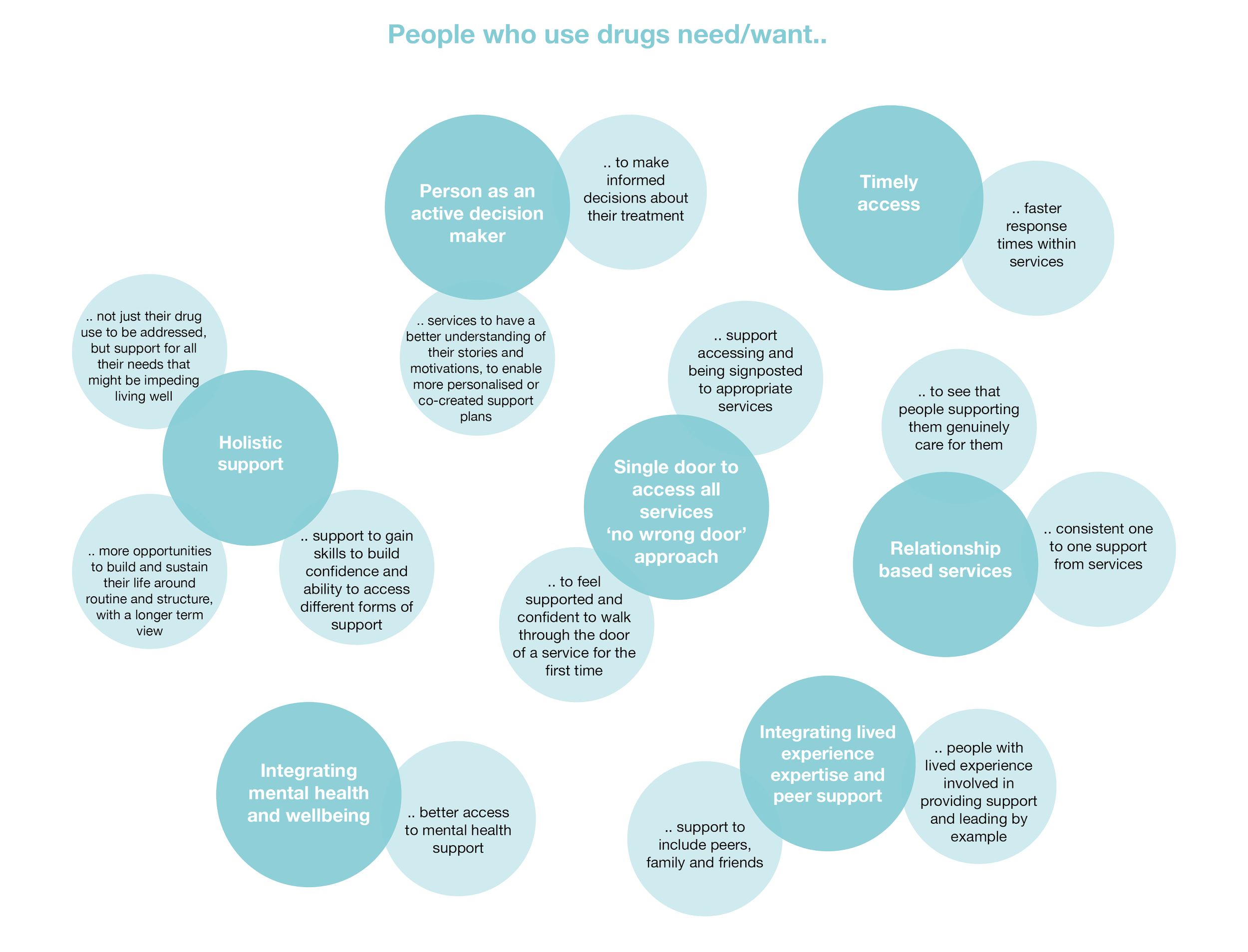
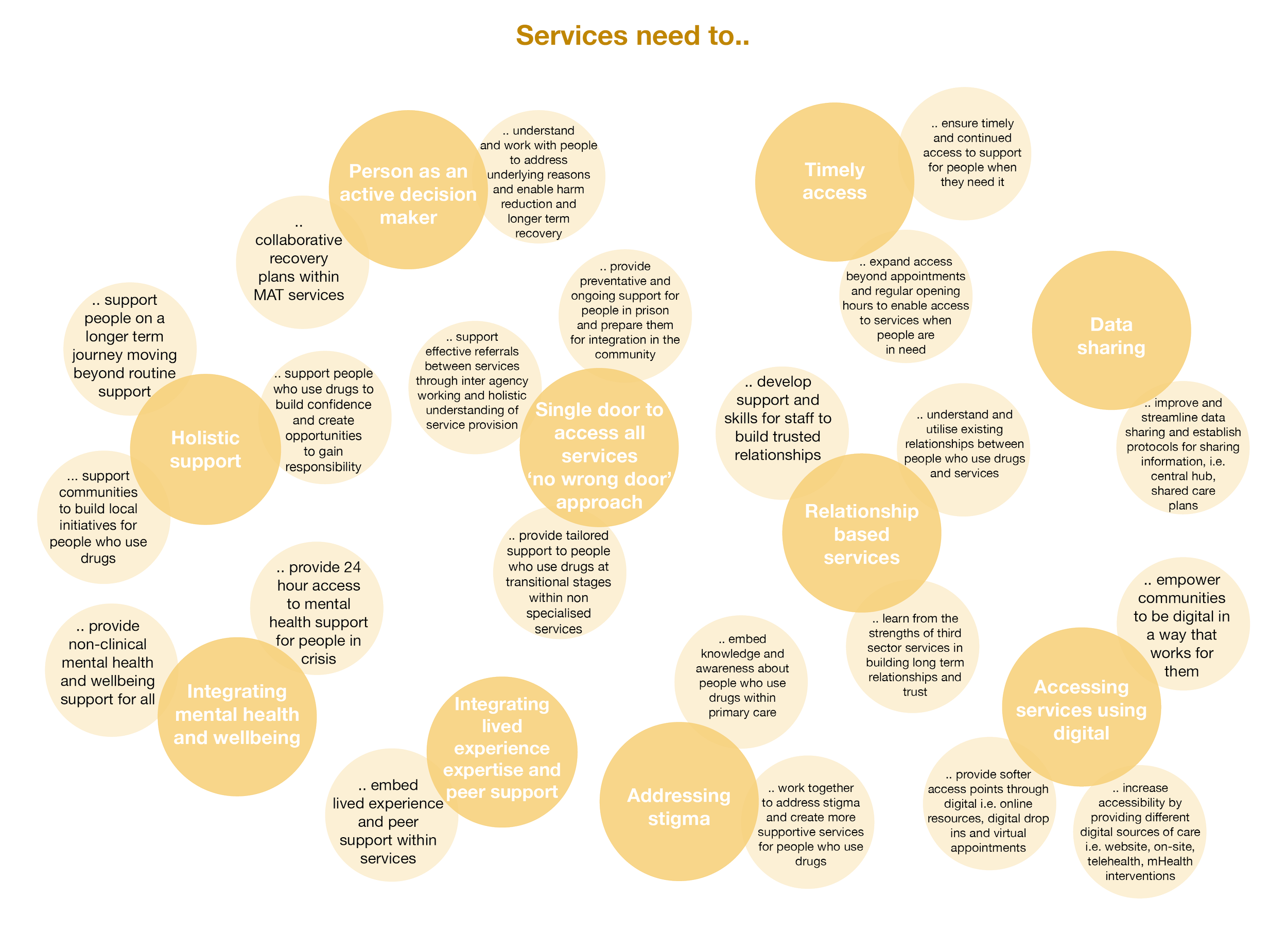
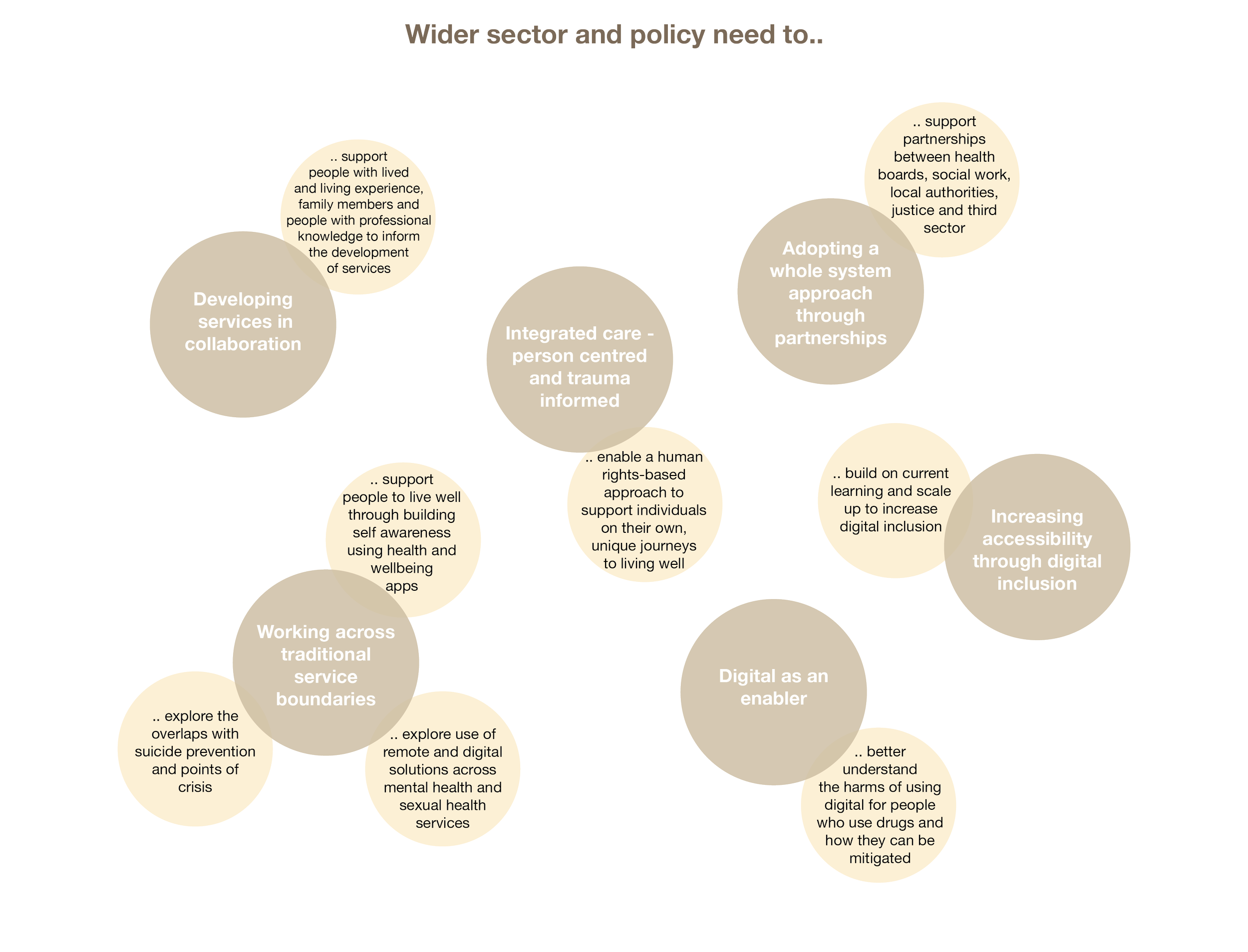
NEXT STEPS
The key insights and themes from different perspectives (i.e., lived experience, service, sector, policy and digital) and opportunities for digitally enabled services to support people who use drugs and have multiple, complex and enduring needs to reduce risk of harm and live well in the community summarised above will inform the Develop phase of co-designing future digital solutions and services.
Authored by: Sneha Raman and Harriet Simms, January 2023.
Acknowledgement
We would like to thank all of our interview participants for their valuable time and for generously sharing their stories to inspire future services and support. We would also like to thank all participants who took part in the collaborative workshop and service mapping engagements, contributing a wide range of expertise and knowledge around current services and support for people who use drugs from policy, statutory services, and third sector perspectives. We are grateful to our local area partners for supporting the service mapping engagements in Aberdeen City, and service mapping and lived experience engagements in Dundee City.
Funding and partners
Digital Lifelines Scotland programme is led by Digital Health and Care Directorate at the Scottish Government in conjunction with core partners, and is joint funded by Digital Health and Care, Drugs Policy Division, and the Drug Deaths Taskforce. Delivery partners include the Drugs Research Network Scotland (DRNS), the Scottish Council for Voluntary Organisations (SCVO), Turning Point Scotland (TPS), Connecting Scotland and the Digital Health and Care Innovation Centre (DHI).
The Digital Health & Care Innovation Centre (DHI) is part of the Scottish Funding Council’s Innovation Centre Programme.







